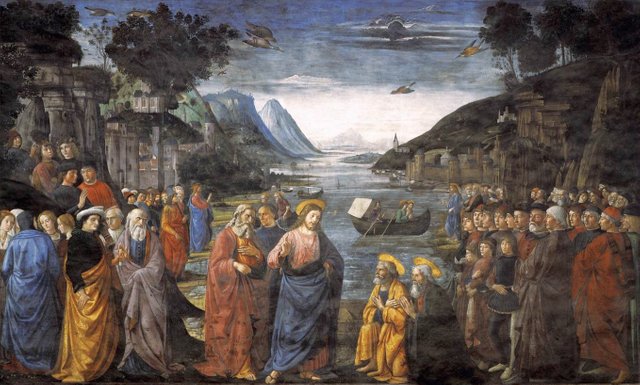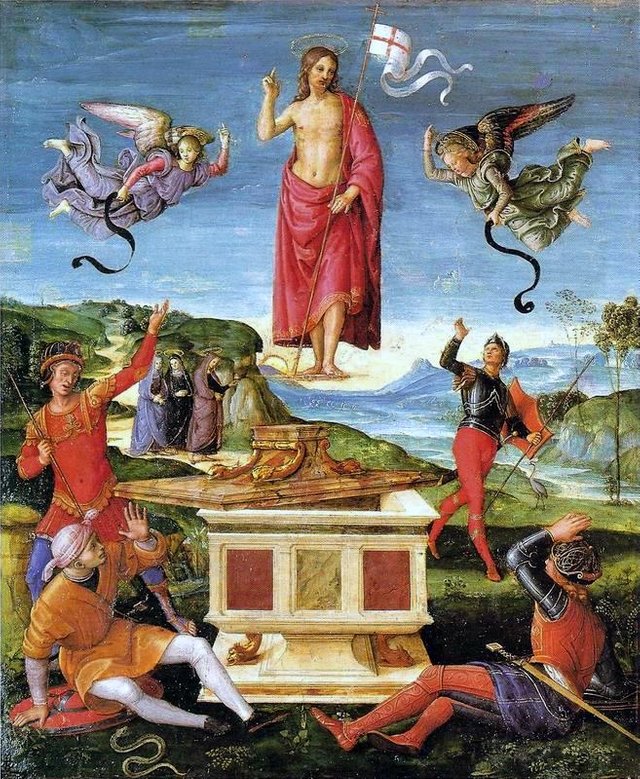(Jesus (History)........)


@bloody....
Jesus Christ (c. 6/4 BCE - c. 30 CE), also called Jesus son of Joseph, Jesus of Nazareth, Jesus of Galilee or simply “Christ”, was a Jewish religious leader who became a central figure in Christianity, regarded by most Christian branches as God himself. He is also considered an important prophet in Muslim tradition and the precursor of Prophet Muhammad.
@bloody....
Christ was not originally Jesus’ name. It was customary among ancient Jews to have only one name and add either the father’s name or the name of their place of origin. This is why during his life, Jesus was called sometimes Jesus of Nazareth and other times Jesus son of Joseph, which is supported by Christian sources (Luke 4.22; John 1.45; 6.42; Acts 10.38). The word Christ is not a name but a title derived for the Greek word christos, a term analogous to the Hebrew expression meshiah, “The anointed one”. Many Jews hoped that the former glory of Israel would be restored by a newly anointed son of King David, and they used the Messiah title to refer to this restorer. Early Christian literature sometimes combined the name of Jesus and his title using them together as Jesus’ name: Jesus Christ or Christ Jesus. The reason for this is that the early followers of Jesus’ teachings believed he was the Messiah.
Jesus - Over the years the name of Jesus Christ has conjured up more emotion in people than any other name. Some people use His name as a curse word, others in loving endearment, and others yet in a desperate lifeline. People have either hated Him or loved Him, many have given their very lives for Him. Wars have been fought over Him. Some people try to deny that He ever existed. Others say He was just a good teacher or a prophet. Others call Him their Savior - their all in all.
@bloody....
For the Jews, Jesus arrived as the long awaited Messiah. But on His arrival many did not recognize Him. Others refused to accept Him because He did not fit their image as a King. Everywhere He went in His short life on earth, He made enemies and devoted friends. Men hated Him so deeply that they sought to end His life and did crucify Him. Amazingly as the Bible had predicted centuries before their occurrence, all of the events of His life from His lowly birth to death on a cross and then to His resurrection, did occur just as they had been predicted. In spite of this, many people still refused to believe in Christ's existence or reality. They refused to believe the words that He had spoken during His sojourn on earth.
@bloody....
The death and resurrection of Jesus Christ greatly impacted His devoted followers. At His death many went into hiding, fearing for their very lives. But at His resurrection, they finally figured out what He had been trying to tell them and became powerful witnesses to the things that He had said and done. They spoke of how He had changed their lives and the lives of others whom He had touched. The words of their testimony and the power of His name continued to change the lives of many others.
@bloody....
HISTORICAL CONTEXT
The life of Jesus began in north and central Palestine, a region between the Dead Sea and the Jordan River in the east and the Eastern Mediterranean in the west. This region was under Roman control since the 1st century BCE, initially as a tributary kingdom. The Roman campaigns, coupled with internal revolts and the incursion of the Parthians, made the region very unstable and chaotic up until 37 BCE, when Herod the Great (c.73 BCE - 4 BCE) became king. The region gradually gained political stability and became prosperous. Although Jewish in religion, Herod was a vassal king who served the interests of the Roman Empire.
After Herod’s death in 4 BCE, the Romans intervened again in order to split up the Herodian kingdom between three of Herod the Great’s sons. Galilee in the north and Perea in the southeast were entrusted to Herod Antipas (c. 20 BCE - c. 39 CE), whose reign (4 BCE - 39 CE) covered the entire life of Jesus. Philip the Tetrarch was appointed ruler over northern Transjordania. Herod Archelaus was made ruler of Samaria, Judea, and Idumea, and he exercised his power with tyranny and brutality; some of these abuses are recorded in the gospel of Matthew (2.20-23). The combination of killings, revolts, and social turbulence in Archelaus’ realm was too much for the patience of Roman authorities: in 6 CE the Emperor Augustus deposed and exiled Archelaus, sending him to Gaul, and his domain became the Roman Province of Iudaea in 6 CE (sometime spelled Judea, not to be confused with Judea proper, the region between Samaria and Idumea). Thus, Iudaea was under direct Roman administration and the province was governed by rulers directly appointed by the Roman Emperor.
@bloody....
JESUS BELIEVED THAT OUTWARD COMPLIANCE WITH THE LAW WAS NOT AS IMPORTANT AS INNER VALUES SUCH AS LOVE OF ONE'S ENEMIES.
The birth of Jesus raises an interesting paradox in chronology. The Romans used a dating system in which the year of the mythical foundation of the city or Rome was its main reference point and they named that year 1 AUC, which stands for ab urbe condita, “from the founding of the city”. Many centuries after the life of Jesus, Dionysius Exiguus (c. 470 - c. 544 CE), a Greek Monk and theologian who lived in Rome, came to the conclusion that Jesus was born in 753 AUC, and this date became widely accepted. The old Roman dating system was gradually replaced by a new system in which the main reference point was the birth of Jesus. That year came to be known as 1 AD, Anno Domini “The year of our Lord”. The years before the birth of Jesus were named BC, “before Christ”. This means that, according to Dionysius Exiguus' calculations, the city of Rome was founded 753 years before the birth of Jesus. Instead of the BC/AD notation, modern scholarship has an alternative naming for the traditional dating: BCE “before the Common Era” and CE “Common Era”.
None of the gospels shows much interest in dating accurately the birth of Jesus, and there are no references to the Roman dating system, nor to any other dating systems used in the Bible. Matthew simply states that Jesus' birth occurred “in the days of Herod the king [Herod the Great]”. Today we know that the dates worked out by Dionysius Exiguus are not fully accurate. Herod reigned from 716 AUC (37 BCE) to 749 AUC (4 BCE). This makes it impossible for Jesus to have been born in 753 AUC (1 CE) and at the same time been born “in the days of Herod the King”, who died in 4 BCE. In addition to the reference about the time of Herod, Luke (3.1-23) says that Jesus was “about thirty years old” when he was baptized “in the fifteenth year of Tiberius”, which would be around 27 or 28 CE.
Luke (2.1-2) also links the birth of Jesus with a census for taxation purposes ordered by the Roman Emperor Augustus and driven by Quirnius, the Syrian governor. Such an enrollment took place in 6 CE, when Judea was made the property of Augustus and the taxation system had to be restructured. The problem with this reference is that this enrollment did not affect the population of Galilee, where Joseph and Mary lived. Furthermore, if Jesus had been born around 6 CE, it would be inconsistent with Matthew placing Jesus' birth during the time of Herod the Great.
The exact year for Jesus' birth is not known for certain, but there is enough ground to believe that he could not have been born any later than 4 BCE. Moreover, though this is the latest he could have been born, it could well be an earlier date, even as early as 17 BCE according to some scholars.

# Ministry of Jesus
In the Christian gospels, the ministry of Jesus begins with his baptism in the countryside of Roman Judea and Transjordan, near the river Jordan, and ends in Jerusalem, following the Last Supper with his disciples.[1] The Gospel of Luke (3:23) states that Jesus was "about 30 years of age" at the start of his ministry.[2][3] A chronology of Jesus typically has the date of the start of his ministry estimated at around AD 27–29 and the end in the range AD 30–36.[2][3][4][5]
Jesus' Early Galilean ministry begins when after his Baptism, he goes back to Galilee from his time in the Judean desert.[6] In this early period he preaches around Galilee and recruits his first disciples who begin to travel with him and eventually form the core of the early Church[1][7] as it is believed that the Apostles dispersed from Jerusalem to found the Apostolic Sees. The Major Galilean ministry which begins in Matthew 8 includes the commissioning of the Twelve Apostles, and covers most of the ministry of Jesus in Galilee.[8][9] The Final Galilean ministry begins after the death of John the Baptist as Jesus prepares to go to Jerusalem.[10][11]
In the Later Judean ministry Jesus starts his final journey to Jerusalem through Judea.[12][13][14][15] As Jesus travels towards Jerusalem, in the Later Perean ministry, about one third the way down from the Sea of Galilee (actually a fresh water lake) along the River Jordan, he returns to the area where he was baptized.[16][17][18]
The Final ministry in Jerusalem is sometimes called the Passion Week and begins with Jesus' triumphal entry into Jerusalem.[19] The gospels provide more details about the final ministry than the other periods, devoting about one third of their text to the last week of the life of Jesus in Jerusalem.[20]

# Passion of Jesus
The commemoration begins with the portent grievance of the Blessed Virgin Mary, followed by Jesus' triumphal entry into Jerusalem and includes his institution of the Eucharist at Last Supper, his bleeding and Agony in the Garden followed by his arrest by the Sanhedrin priests and ultimate trial before Pontius Pilate. Those parts of the four Gospels that describe these events, as well as the non-canonical Gospel of Peter, are known as the "Passion narratives". In the liturgical calendar of the Roman Catholic Church, the Passion is commemorated in Holy Week, beginning on Friday of Sorrows, the Palm Sunday and culminating on his death on Good Friday.
The word passion has since taken on a more general application and now may also apply to accounts of the suffering and death of Christian martyrs, sometimes using the Latin form passio.[2]
# JESUS IN THE CHRISTIAN SOURCES
The earliest Christian records mentioning the life of Jesus are the letters ascribed to Saint Paul, many of which are actually of uncertain authorship. Some of these letters date back to approximately 65 CE, maybe a few years earlier. The details in these letters do not offer details of the life of Jesus outside the Last Supper and his execution.
We also have the gospels. The word “gospel” means `good news' (from Old English) and refers to the accounts of the life of Jesus. Many different gospels have come down to us but only a group of four are accepted by Christian tradition to be inspired by God. This group is known as the “canonical gospels” and includes the gospels according to Matthew, Mark, Luke, and John. The remaining gospels are known as apocryphal or non-canonical gospels and are not considered to be divinely inspired. Three of the four canonical gospels are labelled as “synoptic gospels” (Matthew, Mark and Luke), because their content presents many similarities. John, however, presents a very different picture of events.

@bloody....
# JESUS IN CHRISTIANITY
Most Christian branches believe that Jesus is the son of God and God himself. The Resurrection of Jesus is considered the very foundation of the Christian faith, and it is also considered vital for the salvation of humankind, that through Jesus' sacrifice there is the promise of eternal life.
In Christianity, it is believed that Mary, the mother of Jesus, conceived Jesus without sexual intercourse, and that the Holy Spirit (one of the three persons in the Christian Holy Trinity) was responsible for Mary’s pregnancy. The virgin condition of Mary during her entire life is also held by many Christian traditions.
The miracle stories surrounding Jesus are also important in Christianity. These are supernatural events believed to be the result of the divine condition of Jesus. Luke (7.18-23) describes Jesus referring to his miracles of healing as proof of the fulfillment of the promises in the Hebrew Scriptures of benefits to the outcasts and those in need (Isa. 29.18-19; 35.5-6; 61.1). In the gospel of John, the miracle stories have a symbolic significance, such as Jesus raising Lazarus (11.25-26) from the dead, a symbol of the victory of Jesus over death.
# JESUS IN ISLAM
Jesus is also present in the Islamic tradition. In the Quran, Jesus' name is Isa Ibn Maryam (Isa “Jesus” and Ibn Maryam “son of Maryam or Mary"). He is a prophet and precursor of Muhammad, but he is not considered to be God or the son of God. Muslims share the idea of a virgin birth and the performance of miracles. His mission in the Quran is described as a guide to the children of Israel. The Quran says that people were made to believe that Jesus was crucified and killed, but this actually never happened.
And because of their saying: We slew the Messiah, Jesus son of Mary, Allah’s messenger - they slew him not nor crucified him, but it appeared so to them; and those who disagree concerning it are in doubt of it; they have no knowledge of it except pursuit of a conjecture; they slew him not for certain. (Quran surah 4.157)
Instead of dying on the cross, the Quran says, God raised Jesus into the heavens: "But Allah toook him up to himself. Allah was ever Mighty, Wise" (Quran surah 4.158).
THE CONTROVERSY OF JESUS' HISTORICITY
Late in the 18th century CE, the suggestion that Jesus did not even exist started to gain popularity in some academic circles. Several arguments were brought forth in order to support this claim, which included:
The many contradictions between the gospels.
The suspicious similarities between the story of Jesus and the story of many religious figures such as Adonis, Attis, Dionysus, Krishna, Mithras and Osiris: a miracle birth, a death for the benefit of humankind, and a glorious resurrection.
The lack of contemporary historical sources on the life of Jesus.
The uncertain authorship of a number of early Christian documents, which many considered inauthentic.
The idea that some accounts of the life of Jesus were exaggerations had been circulating for a long time, but Jesus as a pure myth, a person who never actually existed, was a completely new concept at that time. This debate continued during the 19th century CE, and many works aiming to show that Jesus was a mythological figure were published. Further, it was at this time that the theory concerning the apostle Paul (later Saint Paul) as the creator of the Jesus myth gained currency among scholars, a theory still prevalent today and popularized by the novel The Last Temptation of Christ by Nikos Kazantzakis (first published in English in 1960 CE) and the later film of the book.
@bloody....
Analysing the early non-Christian sources, it seems clear that, by 50 CE, the Christian community was already significant enough to attract the attention of many Roman historians. If Jesus were actually a myth, this would imply that the legend of Christ was invented in one generation. If so, it is probable that, were the gospels pure fiction, some incidents described in them, such as Peter’s denial, the failure of Jesus in trying to work miracles in Galilee, his early insecurity about his mission, his moments of bitterness, and the fight between the disciples for high places in the Kingdom, would have been concealed by the authors.
If the same standards of authenticity applied to Jesus Christ were also applied to figures like Confucius, Hammurabi, Pythagoras, or Socrates, all these men would likewise be consigned to the status of legend. It would be hard to understand the origins of Buddhism without the Buddha, Islam without Mohammed, and Christianity without Jesus. The influence of charismatic leaders, their inspiring actions and appealing ideas, seem to be a crucial factor for the birth of significant religious or philosophical movements.

@bloody....
According to the New Testament, after the Romans crucified Jesus, he was anointed and buried in a new tomb by Joseph of Arimathea but God raised him from the dead[2] and he appeared to witnesses before he ascended into heaven, to sit at the right hand of God.[3]
Paul the Apostle declared that "Christ died for our sins according to the scriptures; And that he was buried, and that he rose again the third day according to the scriptures".(1 Corinthians 15:3–4) The chapter states that such a belief in both the death and resurrection of Christ is of central importance to the Christian faith: "And if Christ has not been raised, then our preaching is in vain and your faith is in vain."(1 Cor 15:14)[4] Paul further asserted "And if Christ has not been raised, your faith is futile and you are still in your sins. Then those also who have fallen asleep in Christ have perished. If in Christ we have hope in this life only, we are of all people most to be pitied."
@bloody....
